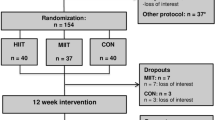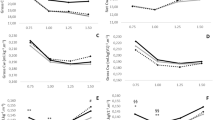Abstract
Objective: To investigate whether walking or resistance training improves weight maintenance after weight loss when added to dietary counselling.
Design: Two months' weight reduction with very-low-energy-diet (VLED) followed by randomization into three groups (control, walking, resistance training) for 6 months' weight maintenance (WM) program and 23 months' unsupervised follow-up. During VLED and WM all groups received similar dietary counselling.
Subjects: The main inclusion criteria were BMI >30 kg/m2, waist>100 cm and physical inactivity (exercise ≤ once a week). Ninety healthy, obese (mean BMI 32.9 kg/m2 and waist 112.5 cm), 35–50 y-old men started the study and 68 were measured at the end of the study.
Measurements: Weight and body composition assessed by underwater weighing. Exercise diaries and dietary records to assess energy balance.
Results: During VLED the mean body weight decreased from 106.0 (s.d. 9.9) kg to 91.7 (9.4) kg. Weight was regained mostly during follow-up and in the end of the study the mean weight in groups was 99.9–102.0 kg. Exercise training did not improve short or long-term weight maintenance when compared to the control group. However, resistance training attenuated the regain of body fat mass during WM (P=0.0l), but not during follow-up. In the combined groups the estimated total energy expenditure (EE) of reported physical activity was associated with less weight regain during WM. EE of 10.1 MJ/week was associated with maintaining weight after weight loss. EE of physical activity tended to decrease after WM in exercise groups due to poor long-term adherence to prescribed exercise. Energy intake seemed to increase during follow-up.
Conclusion: Exercise training of moderate dose did not seem to improve long-term weight maintenance because of poor adherence to prescribed exercise.
This is a preview of subscription content, access via your institution
Access options
Subscribe to this journal
Receive 12 print issues and online access
$259.00 per year
only $21.58 per issue
Buy this article
- Purchase on Springer Link
- Instant access to full article PDF
Prices may be subject to local taxes which are calculated during checkout


Similar content being viewed by others
References
WHO. Obesity: preventing and managing the global epidemic. Report of a WHO consultation on obesity. Technical Report Series No. 894 WHO: Geneva 2000.
Glenny A-M, O'Meara S, Melville A, Sheldon TA, Wilson C . The treatment and prevention of obesity: a systematic review of the literature Int J Obes Relat Metab Disord 1997 21: 715–737.
Ayyad C, Andersen T . Long-term efficacy of dietary treatment of obesity: a systematic review of studies published between 1931 and 1999 Obes Rev 2000 1: 113–119.
Fogelholm M, Kukkonen-Harjula K . Does exercise training prevent weight gain—a systematic review Obes Rev 2000 1: 95–111.
Perri MG . The maintenance of treatment effects in the long-term management of obesity Clin Psychol Sci Pract 1998 5: 526–543.
Wing RR . Physical activity in the treatment of the adulthood overweight and obesity: current evidence and research issues Med Sci Sports Exerc 1999 31 (Suppl): S547–S552.
Jeffery RW, Epstein LH, Wilson GT, Drewnowski A, Stunkard AJ, Wing RR . Long-term maintenance of weight loss: current status Health Psychol 2000 19 (Suppl): 5–16.
Lappalainen R, Tuomisto MT, Giachetti I, D'Amicis A, Paquet S . Recent body-weight changes and weight loss practices in the European Union Publ Health Nutr 1999 2(1A): 135–141.
Garrow JS, Summerbell CD . Meta-analysis: effect of exercise, with or without dieting, on the body composition of overweight subjects Eur J Clin Nutr 1995 49: 1–10.
Votruba SB, Horvitz MA, Schoeller DA . The role of exercise in the treatment of obesity Nutrition 2000 16: 178–188.
Ballor DL, Katch VL, Becque MD, Marks CR . Resistance weight training during caloric restriction enhances lean body maintenance Am J Clin Nutr 1988 47: 19–25.
Ross R, Dagnone D, Jones PJ, Smith H, Paddags A, Hudson R, Janssen I . Reduction in obesity and related comorbid conditions after diet-induced weight loss or exercise-induced weight loss in men. A randomized, controlled trial Ann Intern Med 2000 133: 92–103.
Wadden TA, Vogt RA, Anderson RE, Bartlett SJ, Foster GD, Kuehnel RH, Wilk J, Weinstock R, Buckenmeyer P, Berkowitz RI, Steen SN . Exercise in the treatment of obesity: effects of four interventions on body composition, REE, appetite, and mood J Consult Clin Psychol 1997 65: 269–277.
Fogelholm M, Kukkonen-Harjula K, Nenonen A, Pasanen M . Effects of walking training on weight maintenance after a very-low-energy diet in premenopausal obese women: a randomised controlled trial Arch Intern Med 2000 160: 2177–2184.
Pocock SJ . Clinical trials. A practical approach John Wiley: Chichester 1987.
Henderson M, Freeman CPL . A self-rating scale for bulimia. The ‘BITE’ Br J Psychiatr 1987 105: 18–24.
Brownell KD . The LEARN programs leader's guide: lifestyle, exercise, attitudes, relationships, nutrition: making a weight loss program work Brownell & Hager: Dallas 1989.
Ainsworth BE, Haskell WL, Whitt MC, Irwin ML, Swartz AM, Strath SJ, O'Brien WL, Bassett DR Jr, Schmitz KH, Emplaincourt PO, Jacobs DR Jr, Leon AS . Compendium of physical activities: an update of activity codes and MET intensities Med Sci Sports Exerc 2000 9 (Suppl): S498–S516.
Fogelholm GM, Sievänen HT, van Marken Lichtenbelt WD, Westerterp K . Assessment of fat-mass loss during weight reduction in obese women Metabolism 1997 46: 968–975.
Siri WE . The gross composition of the body In: Tobias CA, Lawrence JH (eds) Advances in biological and medical physics Academic Press: New York 1956 pp 239–280.
Perri MG, McAllister D, Gange JJ, Jordan RC, McAdoo WG, Nezu AM . Effects of four maintenance programs on the long-term management of obesity J Consult Clin Psychol 1988 56: 529–534.
Leermakers EA, Perri MG, Shigaki CL, Fuller PR . Effects of exercise-focused versus weight-focused maintenance programs on the management of obesity Addict Behav 1999 24: 219–227.
Black AE, Goldberg GR, Jebb SA, Livingstone MBE, Cole TJ, Prentice AM . Critical evaluation of energy intake using fundamental principles of energy physiology: 2. Evaluating the results of published surveys Eur J Clin Nutr 1991 45: 583–599.
Heerstrass DW, Ocke MC, Bueno-de-Mesquita HB, Peeters PHM, Seidell JC . Underreporting of energy, protein and potassium intake in relation to body mass index Int J Epidemiol 1998 27: 186–193.
Zhang J, Temme EH, Sasaki S, Kesteloot H . Under- and over-reporting of energy intake using urinary cations as biomarkers: relation to body mass index Am J Epidemiol 2000 152: 453–462.
Black AE . Within- and between-subject variation in energy expenditure measured by doubly labelled water: implication for assessing the validity of reported dietary energy intake Eur J Clin Nutr 2000 54: 386–394.
Schoeller DA, Shay K, Kushner RF . How much physical activity is needed to minimize weight gain in previously obese women Am J Clin Nutr 1997 66: 551–556.
McQuire MT, Wing RR, Klem ML, Seagle HM, Hill JO . Long term maintenance of weight loss: do people who lose weight through various weight loss methods use different behaviours to maintain their weight Int J Obes Relat Metab Disord 1998 22: 572–577.
Leermakers EA, Dunn AL, Blair SN . Exercise management of obesity Med Clin N Am 2000 84: 419–440.
Pate RR, Pratt M, Blair SN, Haskell WL, Macera CA, Bouchard C, Buchner D, Ettinger W, Heath GW, King AC . Physical activity and public health. A recommendation from the Centers for Disease Control and Prevention and the American College of Sports Medicine JAMA 1995 273: 402–407.
Perri MG, Martin AD, Leermakers EA, Sears SF, Notelvitz M . Effects of group- versus home-based exercise in the treatment of obesity J Consult Clin Psychol 1997 65: 278–285.
Jakicic JM, Winters C, Lang W, Wing RR . Effects of intermittent exercise and use of home exercise equipment on adherence, weight loss, and fitness in overweight women JAMA 1999 282: 1554–1560.
King AC, Haskell WL, Young DR, Kraemer HC, Debusk RF . Group- vs. home-based exercise training in healthy older men and women: a community based clinical trial JAMA 1991 266: 1535–1542.
Acknowledgements
This study was supported in Finland by Emil Aaltonen Foundation, the Ministry of Education, the Ministry of Social Affairs and Health, Juho Vainio Foundation and the pharmaceutical company Leiras Oy. We thank our laboratory staff, Leena Rámó MD, Tuija Pokki BSc and Ms Kati Ojala at the UKK Institute for their valuable work throughout the study.
Author information
Authors and Affiliations
Corresponding author
Rights and permissions
About this article
Cite this article
Borg, P., Kukkonen-Harjula, K., Fogelholm, M. et al. Effects of walking or resistance training on weight loss maintenance in obese, middle-aged men: a randomized trial. Int J Obes 26, 676–683 (2002). https://doi.org/10.1038/sj.ijo.0801962
Received:
Revised:
Accepted:
Published:
Issue Date:
DOI: https://doi.org/10.1038/sj.ijo.0801962
Keywords
This article is cited by
-
Obesity-induced and weight-loss-induced physiological factors affecting weight regain
Nature Reviews Endocrinology (2023)
-
Strategie di mantenimento del calo ponderale nel paziente con obesità
L'Endocrinologo (2023)
-
The PROMOTE study (High-protein and resistance-training combination in overweight and obesity) for short-term weight loss and long-term weight maintenance for Chinese people: a protocol for a pilot randomized controlled trial
Trials (2020)
-
Long-term weight loss trajectories following participation in a randomised controlled trial of a weight management programme for men delivered through professional football clubs: a longitudinal cohort study and economic evaluation
International Journal of Behavioral Nutrition and Physical Activity (2018)
-
Longitudinal Weight Loss Patterns and their Behavioral and Demographic Associations
Annals of Behavioral Medicine (2016)



